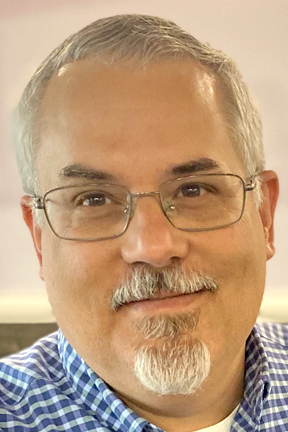Praying • Acts 12:6-18
By Roland L. McMillan

The church began in Jerusalem and was based in Jerusalem during the early years. As Luke tells the story of the spread of the church, a shift begins in Acts 8. The gospel spreads beyond Jerusalem after the martyrdom of Stephen. From the opening of Acts 8 through the end of Acts 12, Luke detailed the beginnings of the mission to the Gentiles. After Acts 12, the focus leaves the Jerusalem church and shifts to the Gentile mission.
As Acts 12 opens, opposition against the church had been building from both the elites and the common people. Herod Agrippa I, a grandson of Herod the Great, had been installed as king by the Romans. He was a political creature, and persecuting the church was popular. James the apostle was executed, and Peter was arrested. Herod kept Peter in jail, waiting for the Passover festival to finish before his planned trial and execution. The last time that Peter was arrested, he had been miraculously released along with the rest of the apostles (Acts 5). This time he was kept under heavy guard. Apparently, Peter’s story was about to end.
The lesson passage begins on the night before Peter’s trial as the church is praying. Peter was in a deep sleep, so deep that the angel sent to rescue him had to whack him on the side. Still bleary-eyed, the angel had to give Peter step-by-step instructions for the escape. The angel left Peter a block away from the jail, and he finally becomes fully awake. Peter decided to go to one of the houses in Jerusalem where Christians would gather, the house of John Mark’s mother, Mary. A servant girl, Rhoda, left the prayer gathering to answer the door. She did not see Peter, but recognized his voice from the other side of the door. In her excitement, she ran back to tell the others that Peter was there. Meanwhile, he is standing at the door on the street. Peter waited. The iron gate of the prison was no obstacle, but the door to the house-church stayed closed. The group had been praying for Peter’s deliverance, but they tried to explain to Rhoda why Peter was not at the door.
Peter knocked and knocked, and finally they opened the door. Talking in their amazement, Peter had to motion for quiet so that he could speak. He told them the details of his angelic rescue and asked that they tell James and the others what had happened. James, the half-brother of Jesus, had taken the leadership of the Jerusalem church when persecution scattered the apostles. Just after his deliverance, Peter left Jerusalem too. He continued to represent Jesus until the end of his life a couple of decades later, but except for a brief reappearance, he fades away from Luke’s story after this episode. The story in Acts turns to focus on the Gentile mission. The gospel continued to spread.
Several years ago, a family in our church hosted an exchange student from another country where Christians are rare. A few weeks after her first exposure to Christianity, she commented that everything sounded like fairy tales. As our country changes, more people around us think this way, but this story displays the kinds of details that fairy tales do not have. Throughout the Bible, the stories have the kinds of details that come from memories. In this case, there is a specific time: Passover. There is a specific villain: Herod Agrippa I. If someone were to make up a story like this one, we would expect that a leader, missionary, and apostle like Peter would be the hero, but that is not the case. The angel had to tell Peter to put on his clothes and shoes. Peter needed step-by-step instructions to escape. The people in the prayer meeting were not heroes either. Their prayers had been answered and they argued against the proof standing on the other side of the door. Specific people are named in the story, Mary, her son John Mark, her servant Rhoda, and James, the leader of the church. There are other details, too, like the “outer gate” in verse 13, implying that it was a large house. Everything about this story points to it being an authentic memory of the power of God and his answer to the prayers of his people.
McMillan is pastor of Prentiss Church, Prentiss.




